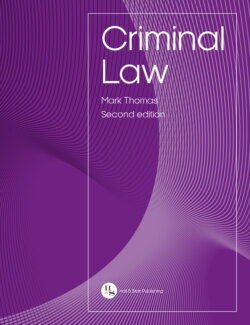Читать книгу Criminal Law - Mark Thomas - Страница 86
На сайте Литреса книга снята с продажи.
2.6.4.2A duty imposed by statute
ОглавлениеThere are many statutory provisions (mostly regulatory) which specifically impose duties on particular persons to act in certain ways and which impose criminal sanctions for failing to act. Such liability is often referred to as ‘direct liability’. Road traffic law provides many examples of this, including failing to provide a specimen of breath when required to do so (Road Traffic Act (RTA) 1988, s 7(6)) and failing to provide the name and address of a person involved in a road traffic accident (RTA 1988, s 170). A useful guide when considering duties imposed by statute is to check the wording of the offence.
We shall take two more examples to prove this point. Section 24A of the Theft Act 1968 provides that it is an offence if a person should dishonestly fail to take such steps as are reasonable in the circumstances to secure that any wrongful credit to an account held by him is cancelled. In addition, s 5 of the Domestic Violence, Crimes and Victims Act 2004 creates an offence of failing to protect a child or vulnerable adult from a risk of death or serious physical harm by a person who lives with them or has frequent contact with them (see R v Khan [2009] EWCA Crim 2).
All four examples above refer to a ‘failure’ to act in a certain capacity. Although there are other duties imposed by statute that do not include the word ‘failure’ (for example, s 19 of the Terrorism Act 2000 and s 84 of the Companies Act 2006 use the phrases ‘does not disclose’ and ‘fails to comply’ respectively), the statutes are clear in their wording that there is a duty to act, and an omission will result in criminal liability.
